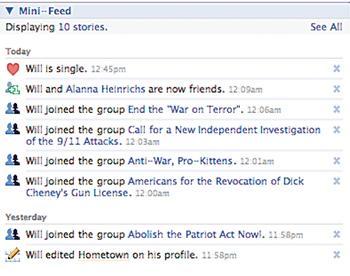Facebook’s shining reputation with students was significantly blemished with the introduction of a simple News Feed. Sold as a way for distant friends or acquaintances to keep up with each others’ busy lives by the minute, it was met with overwhelming disapproval with thousands of users joining groups such as “I Hate Facebook’s Facelift,” others vowing to go on the virtual lam from “e-stalkers,” and a few threatening to remove their profile from the site entirely. Creator Mark Zuckerberg soon responded with an open letter apologizing for the lack of privacy controls at the time of launch. Since then, privacy controls have been coded in and students have begun to accept the changes to their favorite social networking site. While the symptoms of hysteria have been eased, the problems of Facebook misuse persist.
Anti-corporate, Che Guerava t-shirt-wearing Facebook denizens may find themselves in a moral quandary regarding their patronage of the site. Call it “Big Facebook” if you will because Facebook is indeed serious business. It started in 2004 with PayPal founder Peter Thiel giving $500,000 to help Zuckerberg’s brain child get on its feet. To date, Facebook has attracted approximately $25 million worth of venture capital along with a newly inked advertisement partnership with Microsoft.
Meanwhile, it’s been whispered that Zuckerberg is planning to cash in on his creation if the right buyer presents themselves. While business analysts squabble whether Facebook is worth $750 million or $2 billion, it is certainly a gold-mine for advertisers and others seeking the personal information students put on the web.
Hobbies, interests, favorite music and movies, political and religious views, even students’ extra-legal social activities are all on display. Marketers and entrepreneurs aren’t the only ones watching either. Administrators, law enforcement and employers have all taken to checking up on students and prospective employees.
Two LSU swimmers found their athletic scholarships terminated last year after they posted negative comments about their coaches on Facebook. A University of Illinois graduate found his hopes for a summer internship at a Chicago consulting firm dashed when the company president found his interests included “smokin’ blunts.” The geek-old adage “information wants to be free” could not be more relevant today.
White earbuds a fashion accessory, laptops in lecture halls and nary a student found without the electronic leash that is the cellphone all illustrate the indisputable fact that this generation is extremely tech-savvy. Unfortunately, what is not in the manual is how to integrate these tools into our lives.
Students have put into words and images things that may not be considered appropriate for polite conversation, much less publication on a world wide network. Political beliefs and campaign issues are put on display in all their bumper-sticker-style glory. In our age of Wikipedia, we can glean information about a wide variety of topics we never really cared about. Wish no longer to be the fly on the wall when the latest dorm drama comes to a head, it’s now at your fingertips.
At the risk of sounding like a luddite, all of this leads to what some may term “paradoxical isolation” as real world news and events are digested digitally in an instant. But it is just plain, simple textbook isolation. Political groups and “campaign issues” on Facebook will likely never materialize on the streets or in Free Speech Alley, but they will be another badge for the “concerned” student. Debate and discussion is performed keg-stand style as people consume mass quantities of information and spew back comments on message boards. Too many students will live their social lives vicariously through others in between classes or video game binge sessions.
But there is hope. Whether Facebook is advertiser-driven or not, publically owned or privately held, the fact remains it is a useful tool. Just like the iPods, laptops and cell phones of today, it can be used to enhance our lives rather than overload the senses. Classmates can connect, people can debate if liberals are sexier than conservatives or just poke each other for all the inexplicable reasons they do. But it must be done with purpose and as a supplement to a life lived, not a replacement.
Everything started with a shuffle. All the information in the hated News Feed is a compilation of what is already out there. What’s out there is not always in the students’ best interest or sometimes is just frighteningly mundane. Whether Facebook continues to be the social supplement it is or a self-replicating marketing database cannot be answered now.
—–Contact Joseph Ruchalski at jruchalski@lsureveille.com
The pros and cons of using Facebook
September 11, 2006

screenshot captured from www.thefacebook.com



